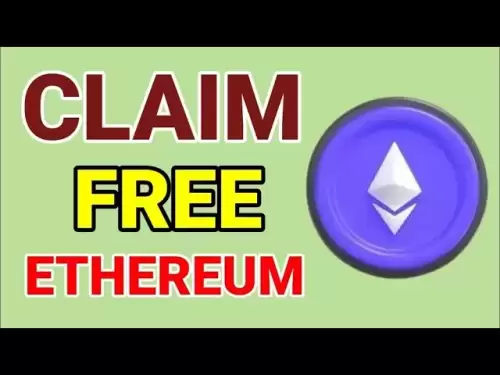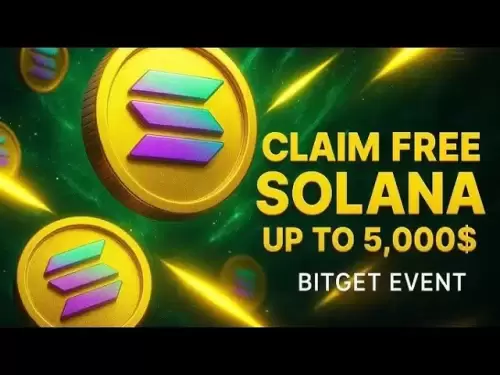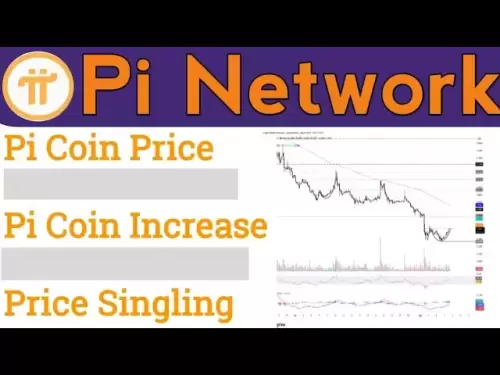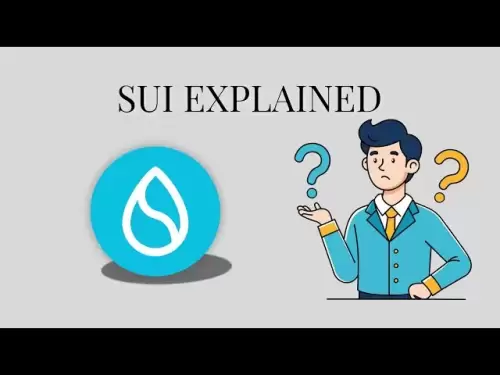-
 Bitcoin
Bitcoin $116900
0.00% -
 Ethereum
Ethereum $4280
5.48% -
 XRP
XRP $3.265
-1.45% -
 Tether USDt
Tether USDt $1.000
-0.01% -
 BNB
BNB $807.0
1.41% -
 Solana
Solana $183.1
2.93% -
 USDC
USDC $0.9999
0.00% -
 Dogecoin
Dogecoin $0.2440
6.50% -
 TRON
TRON $0.3357
-0.88% -
 Cardano
Cardano $0.8178
2.63% -
 Hyperliquid
Hyperliquid $44.13
7.45% -
 Chainlink
Chainlink $21.39
9.09% -
 Stellar
Stellar $0.4524
-0.84% -
 Sui
Sui $3.957
2.13% -
 Bitcoin Cash
Bitcoin Cash $572.7
-2.54% -
 Hedera
Hedera $0.2671
1.54% -
 Avalanche
Avalanche $24.77
4.17% -
 Ethena USDe
Ethena USDe $1.001
0.02% -
 Litecoin
Litecoin $122.3
-1.94% -
 Toncoin
Toncoin $3.432
2.26% -
 UNUS SED LEO
UNUS SED LEO $9.007
0.49% -
 Shiba Inu
Shiba Inu $0.00001396
5.26% -
 Uniswap
Uniswap $11.09
1.64% -
 Polkadot
Polkadot $4.155
4.57% -
 Dai
Dai $1.000
0.00% -
 Pepe
Pepe $0.00001253
5.11% -
 Cronos
Cronos $0.1588
2.67% -
 Bitget Token
Bitget Token $4.512
0.05% -
 Monero
Monero $275.0
0.64% -
 Ethena
Ethena $0.7527
15.10%
What is the mining mechanism of Sol coin?
Solana uses a Proof-of-History (PoH) and Proof-of-Stake (PoS) hybrid, unlike Bitcoin's Proof-of-Work. PoH timestamps transactions, while PoS uses validators staking SOL to secure the network, enabling high throughput and low latency.
Mar 14, 2025 at 10:35 am
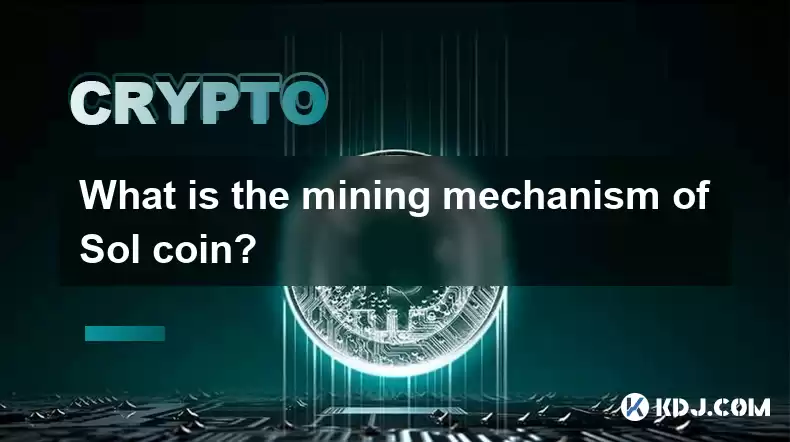
Key Points:
- Solana's mining mechanism is fundamentally different from Proof-of-Work (PoW) used by Bitcoin. It employs a novel Proof-of-History (PoH) mechanism in conjunction with Proof-of-Stake (PoS).
- PoH provides a timestamping mechanism, creating a verifiable history of transactions before they're added to the blockchain.
- PoS secures the network through validators who stake SOL tokens to validate transactions and propose new blocks.
- The combination of PoH and PoS aims to achieve high throughput and low latency, distinguishing Solana from other blockchains.
- Participation in Solana's network requires staking SOL, either directly or through delegation to a validator.
What is the mining mechanism of Sol coin?
Solana doesn't use the traditional "mining" process associated with Bitcoin and other Proof-of-Work cryptocurrencies. Instead of miners solving complex mathematical problems to validate transactions and earn rewards, Solana utilizes a hybrid consensus mechanism combining Proof-of-History (PoH) and Proof-of-Stake (PoS). This fundamentally alters how the network operates and how new blocks are added to the blockchain.
Proof-of-History (PoH) is a unique innovation central to Solana's architecture. It's a cryptographic method for creating a verifiable, sequentially ordered history of events. Essentially, it generates a timestamp for each transaction, ensuring that the order of events cannot be tampered with. This efficient timestamping system is crucial for Solana's high transaction throughput. It pre-orders transactions before they reach the network, significantly reducing the time required for consensus.
Proof-of-Stake (PoS) is the other half of Solana's consensus mechanism. Unlike PoW's energy-intensive process, PoS relies on validators who "stake" their SOL tokens to secure the network. These validators are responsible for validating transactions and proposing new blocks to the blockchain. The more SOL a validator stakes, the higher their chance of being selected to validate transactions and receive rewards. This system incentivizes validators to act honestly and maintain the network's integrity.
The interplay between PoH and PoS is what makes Solana's mechanism so efficient. PoH provides the ordered history, while PoS provides the security and incentive structure. This combination allows Solana to achieve remarkably high transaction speeds and low latency, capabilities often lacking in other blockchain networks. This is achieved without sacrificing security, as the PoS mechanism still requires consensus amongst validators.
How does staking SOL work in Solana's network?
Staking SOL is essential for participating in Solana's consensus mechanism and earning rewards. You can stake your SOL directly, requiring technical knowledge and understanding of the process, or you can delegate your SOL to a validator. Delegation simplifies participation, allowing users to earn rewards without needing to run a validator node.
- Staking Directly: This involves running your own validator node, requiring significant technical expertise and hardware resources. The reward is higher than delegation but comes with added responsibility and risk.
- Delegating to a Validator: This method allows users to stake their SOL through a chosen validator. The validator manages the technical aspects of validating transactions, and the rewards are shared proportionally among delegators. This option is more accessible to average users.
Choosing a validator requires careful research. Consider factors like the validator's uptime, performance, and commission rate. Diversifying your delegation across multiple validators can mitigate risk.
What are the advantages and disadvantages of Solana's mining mechanism?
Solana's hybrid consensus mechanism presents several advantages, primarily its exceptionally high throughput and low transaction fees compared to many other blockchains. The energy efficiency of PoS is also a significant benefit compared to the energy-intensive PoW consensus. The fast transaction speeds make Solana attractive for decentralized applications (dApps) requiring quick and efficient processing.
However, the complexity of Solana's PoH and PoS combination also presents challenges. The system's intricate nature can make it more difficult to understand and audit, potentially leading to vulnerabilities. Furthermore, the concentration of staking among large validators raises concerns about decentralization and potential centralization risks. The network's past outages also highlight its vulnerability to disruptions.
Frequently Asked Questions:
Q: Is Solana mining profitable?
A: The term "mining" is inaccurate for Solana. Instead of mining, users earn rewards by staking their SOL tokens. Profitability depends on several factors, including the amount of SOL staked, the validator's performance, and the current SOL price. Rewards are paid in SOL.
Q: How much SOL do I need to stake?
A: There's no minimum amount of SOL required to stake, although larger stakes generally earn proportionally higher rewards. Delegating to a validator allows participation with smaller amounts of SOL.
Q: Is staking SOL risky?
A: Staking SOL carries risks, including the possibility of validator downtime, slashing penalties for misbehavior, and the volatility of the SOL price. Diversifying delegation and choosing reputable validators can mitigate these risks.
Q: How does Solana's mechanism compare to other cryptocurrencies?
A: Solana's PoH and PoS hybrid differs significantly from the PoW used by Bitcoin and Ethereum (prior to the merge). It aims for higher throughput and lower latency than many other blockchains, but it also introduces complexities and potential vulnerabilities. Ethereum's transition to PoS shares some similarities with Solana's PoS mechanism, but it lacks the PoH component.
Disclaimer:info@kdj.com
The information provided is not trading advice. kdj.com does not assume any responsibility for any investments made based on the information provided in this article. Cryptocurrencies are highly volatile and it is highly recommended that you invest with caution after thorough research!
If you believe that the content used on this website infringes your copyright, please contact us immediately (info@kdj.com) and we will delete it promptly.
- Shiba Inu, Pepe, and Remittix: A Tale of Memes, Hype, and Real-World Utility
- 2025-08-10 08:30:12
- Ethereum Price, ETH Tokens, Rally Prediction: Is a New All-Time High In Sight?
- 2025-08-10 08:30:12
- XRP, Elon Musk, and Wealth: A Crypto Conundrum
- 2025-08-10 08:50:12
- Retire Early with Crypto: High-Conviction Plays Beyond Bitcoin
- 2025-08-10 08:50:12
- BlockDAG, Render, and Polkadot: Charting the Course for Long-Term Crypto Dominance
- 2025-08-10 08:55:21
- Toncoin's Ascent: Price Predictions and the VERB Strategy Impact
- 2025-08-10 08:55:21
Related knowledge

How to purchase Aragon (ANT)?
Aug 09,2025 at 11:56pm
Understanding Aragon (ANT) and Its PurposeAragon (ANT) is a decentralized governance token that powers the Aragon Network, a platform built on the Eth...

Where can I buy UMA (UMA)?
Aug 07,2025 at 06:42pm
Understanding UMA and Its Role in Decentralized FinanceUMA (Universal Market Access) is an Ethereum-based decentralized finance (DeFi) protocol design...

How to buy Storj (STORJ) tokens?
Aug 09,2025 at 07:28am
Understanding Storj (STORJ) and Its Role in Decentralized StorageStorj is a decentralized cloud storage platform that leverages blockchain technology ...

What is the best app to buy Nano (NANO)?
Aug 09,2025 at 03:35am
Understanding Nano (NANO) and Its Unique FeaturesNano is a feeless, instant cryptocurrency designed for fast peer-to-peer transactions. Unlike many ot...

Where can I purchase Siacoin (SC)?
Aug 08,2025 at 11:14am
Understanding Siacoin (SC) and Its Role in the Sia NetworkSiacoin (SC) is the native cryptocurrency of the Sia decentralized cloud storage platform, a...
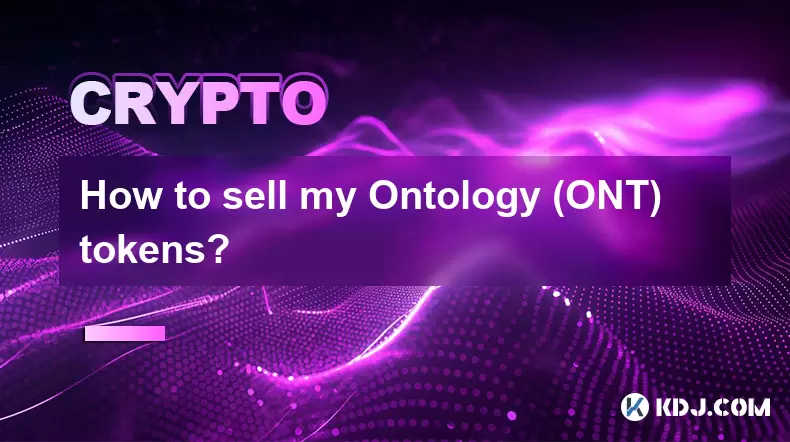
How to sell my Ontology (ONT) tokens?
Aug 09,2025 at 06:08pm
Understanding Ontology (ONT) and Its Trading EcosystemBefore selling your Ontology (ONT) tokens, it's essential to understand the nature of the crypto...

How to purchase Aragon (ANT)?
Aug 09,2025 at 11:56pm
Understanding Aragon (ANT) and Its PurposeAragon (ANT) is a decentralized governance token that powers the Aragon Network, a platform built on the Eth...

Where can I buy UMA (UMA)?
Aug 07,2025 at 06:42pm
Understanding UMA and Its Role in Decentralized FinanceUMA (Universal Market Access) is an Ethereum-based decentralized finance (DeFi) protocol design...

How to buy Storj (STORJ) tokens?
Aug 09,2025 at 07:28am
Understanding Storj (STORJ) and Its Role in Decentralized StorageStorj is a decentralized cloud storage platform that leverages blockchain technology ...

What is the best app to buy Nano (NANO)?
Aug 09,2025 at 03:35am
Understanding Nano (NANO) and Its Unique FeaturesNano is a feeless, instant cryptocurrency designed for fast peer-to-peer transactions. Unlike many ot...

Where can I purchase Siacoin (SC)?
Aug 08,2025 at 11:14am
Understanding Siacoin (SC) and Its Role in the Sia NetworkSiacoin (SC) is the native cryptocurrency of the Sia decentralized cloud storage platform, a...

How to sell my Ontology (ONT) tokens?
Aug 09,2025 at 06:08pm
Understanding Ontology (ONT) and Its Trading EcosystemBefore selling your Ontology (ONT) tokens, it's essential to understand the nature of the crypto...
See all articles





















